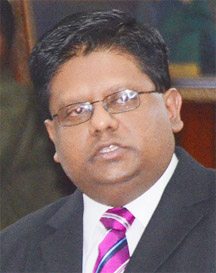Finance Minister Dr Ashni Singh is calling on Caribbean countries to address the situation of chronic under-diversification as soon as possible, if they are to make lasting gains in the fight against poverty and to attain equality.
Dr Singh was at the time serving as a panelist at a high-level seminar organised by the United Nations Economic Commission for Latin America and the Caribbean (ECLAC) on the occasion of its launching of a publication entitled “Structural Change for Equality: An Integrated Approach to Develop-ment” in El Salvador on Thursday, the Government Information Agency (GINA) reported.

Minister Singh also observed that fifty years after some Caribbean countries had gained political independence, Caribbean economies remain chronically under-diversified.
Dr Singh welcomed the publication, stating that many of its conclusions would resonate with policymakers across Latin America and the Caribbean.
The finance minister also highlighted the unique circumstances of small states such as the Caribbean islands, and emphasised that the policy options and policy instruments available to the small states of the Caribbean to confront economic challenges were often much more limited than those available to larger states.
Dr Singh pointed out that, in particular, the limited extent of diversification and limited opportunities for diversification in such states were well known. However, he noted that the international and development community had devoted considerable policy effort to defining the problem faced by small states, but despite this effort, credible solutions remained elusive.
Meanwhile, Dr Singh urged ECLAC to consider that a gap existed in the knowledge products currently available, as it relates to strategies for overcoming the chronic under-diversification faced by the Caribbean. He posited that if ECLAC would embrace such work, its outcomes would be very helpful to policymakers in those countries.
Similarly, the Caribbean needs a strategy to achieve and maintain fiscal, debt, and external sustainability, given that the region is known to include some of the world’s most indebted nations, including a few that were actually middle income countries.
Under pressure to scale up social spending and investment in critical infrastructure, Dr Singh pointed out, the options available to those countries to achieve fiscal consolidation were extremely limited. Crafting a solution to this dilemma required support from agencies such as ECLAC, he added.
The finance minister also welcomed the emphasis placed by the publication on the need for Latin American and Caribbean economies to diversify into more knowledge-based and technology-based industries, arguing that these add more value to the economy, bring more stable jobs, and are more resilient to volatile economic cycles.
According to GINA, Dr Singh drew attention to the fact that many of the recommendations made in the document were reflective of paths already adopted by the government of Guyana, including the move to diversify the domestic productive economy, investment in infrastructure, and social services, such as education and ICT.
Without a doubt, the minister added, the policy choices exercised by the government had contributed to the marked strengthening of the Guyanese economy over the past decade or so. He drew attention to the achievement of uninterrupted growth since 2006, despite the recent global economic crisis that has wreaked havoc in many other Caribbean economies and from which many are still to recover.
The event was held to coincide with the 34th session of ECLAC, GINA added.





